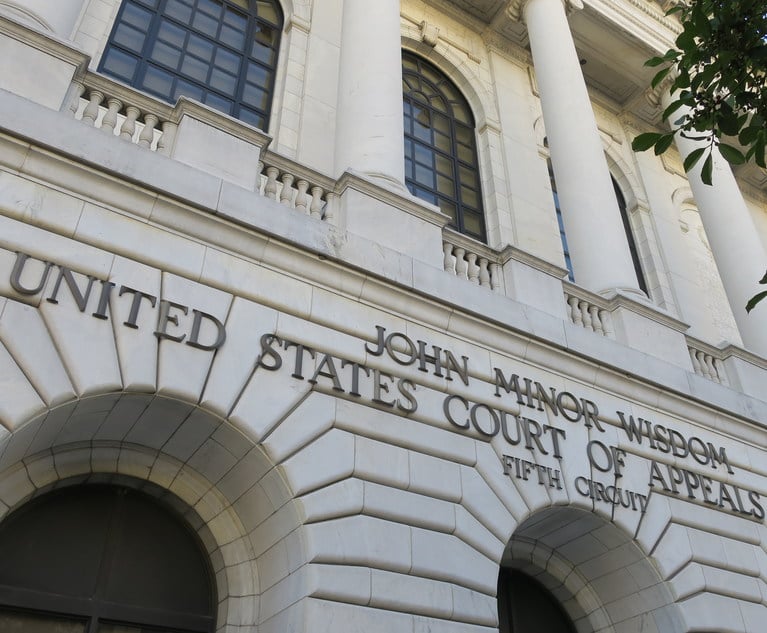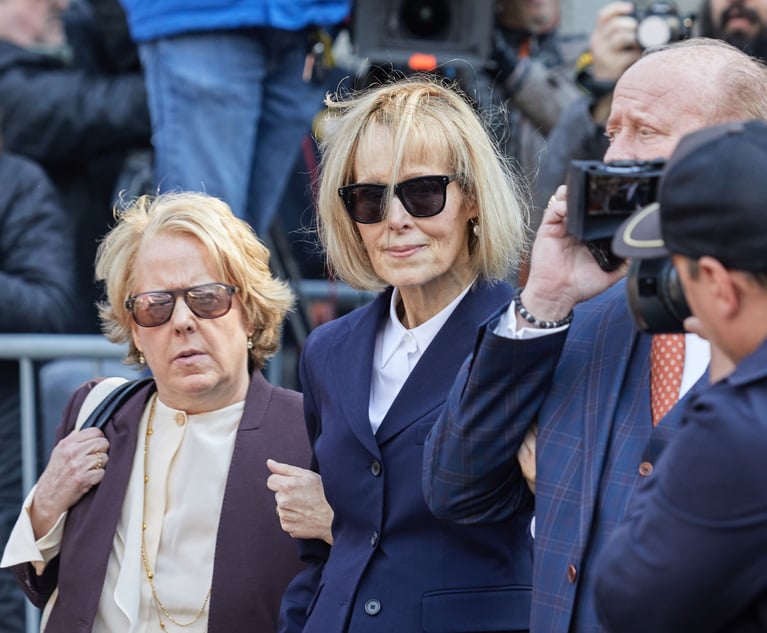Key Labor Case at the US Supreme Court Could Affect Millions of Workers
A report released Wednesday shows that more than 60 million workers in the United States are subject to mandatory arbitration in employment contracts, highlighting the potential scope of a key U.S. Supreme Court case that confronts the legality of those agreements.
September 27, 2017 at 12:12 AM
3 minute read
A report released Wednesday shows that more than 60 million workers in the United States are subject to mandatory arbitration in employment contracts, highlighting the potential scope of a key U.S. Supreme Court case that confronts the legality of those agreements.
The Economic Policy Institute's study conducted for the progressive think tank by a Cornell University professor shows the number of companies that use mandatory arbitration clauses in employment contracts has grown significantly since the 1990s.
The U.S. Supreme Court is preparing to hear oral arguments Monday in a series of consolidated cases that question the legality of clauses that limit the power of employees to join class actions against their employer. The consolidated cases before the justices are: National Labor Relations Board v. Murphy Oil USA; Epic Systems v. Lewis; and Ernst & Young v. Morris.
The data in the report found that in 1992, only 2 percent of workers required mandatory arbitration, as opposed to 55 percent in 2017. Additionally, the report found that 41 percent of employees subject to mandatory arbitration also waived their rights to be part of a class action.
“We knew they were subtly increasing, but this report shows the majority of private workers are subject of these kind of waivers,” said Celine McNicholas, labor counsel with the Economic Policy Institute. “It's a really scary concept.”
The rise in employee arbitration agreements has been driven by Supreme Court cases dating back to the 1991 case Gilmer v. Interstate/Johnson Lane, in which the justices upheld mandatory employment arbitration agreements. Other Supreme Court rulings—including AT&T Mobility LLC v. Concepcion and the 2013 case American Express v. Italian Colors Restaurants—found that these agreements were broadly enforceable.
In the upcoming case, set for argument on Oct. 2, the Supreme Court will review whether class action waivers and forced arbitration are violations of the National Labor Relations Act. The central issue is whether requiring the waiver infringes the collective speech protected by federal labor laws.
Dozens of major U.S. companies, with lawsuits on hold, are awaiting the outcome of the ruling. Just last week, a federal appeals court decided to postpone any ruling in a case that drivers for Uber Technologies Inc. brought against the ride-hailing company.
In the Supreme Court, business advocates—including the U.S. Chamber of Commerce, The Business Roundtable and the Retail Litigation Center—have urged the justices to uphold the lawfulness of arbitration agreements in employment contracts.
According to the report, conducted by Cornell professor Alexander J.S. Colvin, among non-union private-sector employers 53.9 percent have mandatory arbitration procedures and among companies with 1,000 or more employees, 65 percent have such procedures. Of the employers who require mandatory arbitration, 30 percent also include class action waivers, the report found.
Related Articles:
|This content has been archived. It is available through our partners, LexisNexis® and Bloomberg Law.
To view this content, please continue to their sites.
Not a Lexis Subscriber?
Subscribe Now
Not a Bloomberg Law Subscriber?
Subscribe Now
NOT FOR REPRINT
© 2025 ALM Global, LLC, All Rights Reserved. Request academic re-use from www.copyright.com. All other uses, submit a request to [email protected]. For more information visit Asset & Logo Licensing.
You Might Like
View All
Legal Issues to Watch in the US Appeals Courts in 2025

Second Circuit Upholds $5M Judgment Against Trump in E. Jean Carroll Case
4 minute read
Divided 5th Circuit Shoots Down Nasdaq Diversity Rules

Nevada Supreme Court to Decide Fate of Groundbreaking Contingency Cap Ballot Measure
5 minute readTrending Stories
- 1Decision of the Day: Uber Cannot Be Held Vicariously Liable for Driver's Alleged Negligent Conduct
- 2TikTok Law and TikTok Politics
- 3California Supreme Court Vacates Murder Conviction in Infant Abuse Case
- 4New York’s Proposed Legislation Restraining Transfer of Real Property
- 5Withers Hires Lawyers, Staff From LA Trusts and Estates Boutique
Who Got The Work
Michael G. Bongiorno, Andrew Scott Dulberg and Elizabeth E. Driscoll from Wilmer Cutler Pickering Hale and Dorr have stepped in to represent Symbotic Inc., an A.I.-enabled technology platform that focuses on increasing supply chain efficiency, and other defendants in a pending shareholder derivative lawsuit. The case, filed Oct. 2 in Massachusetts District Court by the Brown Law Firm on behalf of Stephen Austen, accuses certain officers and directors of misleading investors in regard to Symbotic's potential for margin growth by failing to disclose that the company was not equipped to timely deploy its systems or manage expenses through project delays. The case, assigned to U.S. District Judge Nathaniel M. Gorton, is 1:24-cv-12522, Austen v. Cohen et al.
Who Got The Work
Edmund Polubinski and Marie Killmond of Davis Polk & Wardwell have entered appearances for data platform software development company MongoDB and other defendants in a pending shareholder derivative lawsuit. The action, filed Oct. 7 in New York Southern District Court by the Brown Law Firm, accuses the company's directors and/or officers of falsely expressing confidence in the company’s restructuring of its sales incentive plan and downplaying the severity of decreases in its upfront commitments. The case is 1:24-cv-07594, Roy v. Ittycheria et al.
Who Got The Work
Amy O. Bruchs and Kurt F. Ellison of Michael Best & Friedrich have entered appearances for Epic Systems Corp. in a pending employment discrimination lawsuit. The suit was filed Sept. 7 in Wisconsin Western District Court by Levine Eisberner LLC and Siri & Glimstad on behalf of a project manager who claims that he was wrongfully terminated after applying for a religious exemption to the defendant's COVID-19 vaccine mandate. The case, assigned to U.S. Magistrate Judge Anita Marie Boor, is 3:24-cv-00630, Secker, Nathan v. Epic Systems Corporation.
Who Got The Work
David X. Sullivan, Thomas J. Finn and Gregory A. Hall from McCarter & English have entered appearances for Sunrun Installation Services in a pending civil rights lawsuit. The complaint was filed Sept. 4 in Connecticut District Court by attorney Robert M. Berke on behalf of former employee George Edward Steins, who was arrested and charged with employing an unregistered home improvement salesperson. The complaint alleges that had Sunrun informed the Connecticut Department of Consumer Protection that the plaintiff's employment had ended in 2017 and that he no longer held Sunrun's home improvement contractor license, he would not have been hit with charges, which were dismissed in May 2024. The case, assigned to U.S. District Judge Jeffrey A. Meyer, is 3:24-cv-01423, Steins v. Sunrun, Inc. et al.
Who Got The Work
Greenberg Traurig shareholder Joshua L. Raskin has entered an appearance for boohoo.com UK Ltd. in a pending patent infringement lawsuit. The suit, filed Sept. 3 in Texas Eastern District Court by Rozier Hardt McDonough on behalf of Alto Dynamics, asserts five patents related to an online shopping platform. The case, assigned to U.S. District Judge Rodney Gilstrap, is 2:24-cv-00719, Alto Dynamics, LLC v. boohoo.com UK Limited.
Featured Firms
Law Offices of Gary Martin Hays & Associates, P.C.
(470) 294-1674
Law Offices of Mark E. Salomone
(857) 444-6468
Smith & Hassler
(713) 739-1250










